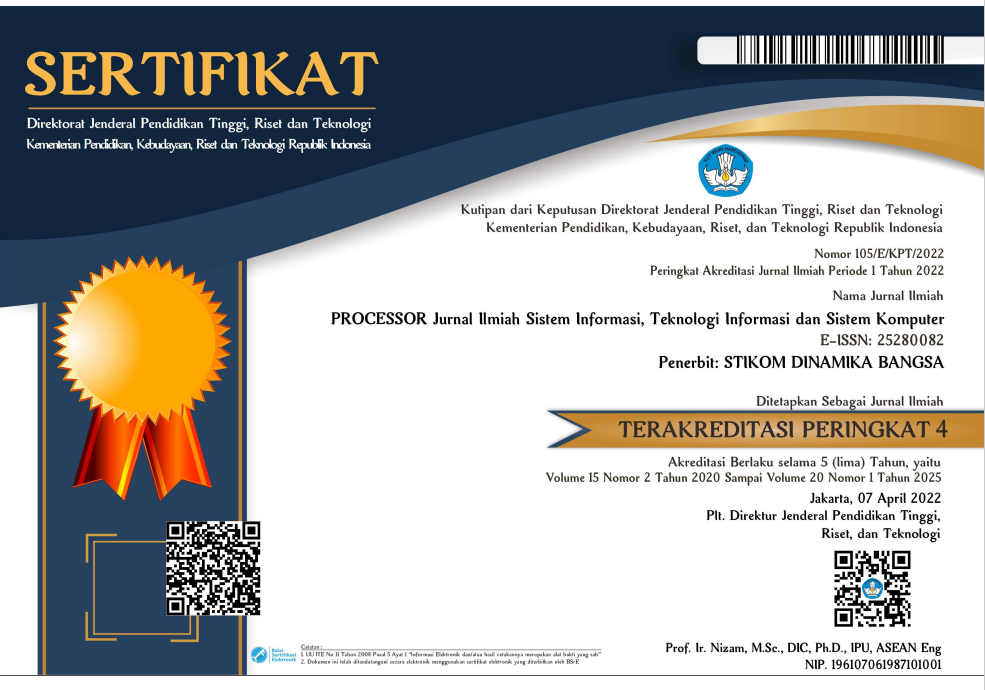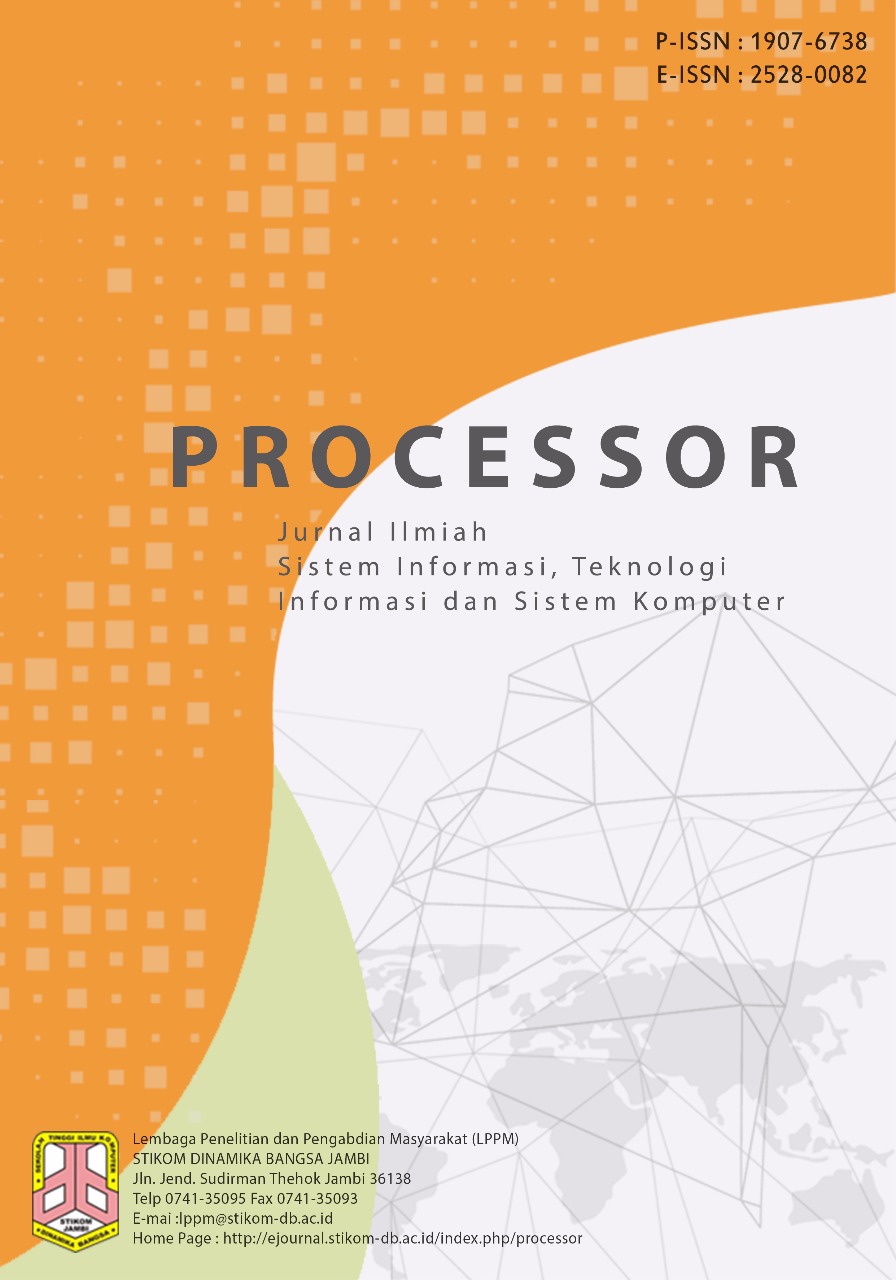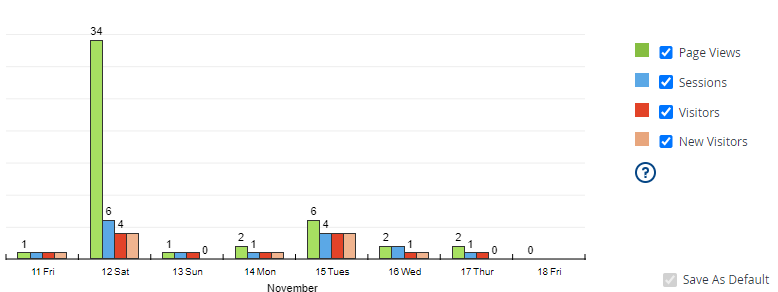Sistem Pendataan Siswa Berbasis AI untuk Analisis Karakter dan Monitoring Perkembangan di SD IT Ananda Empat Lawang
DOI:
https://doi.org/10.33998/processor.2025.20.2.2538Keywords:
Artificial Intelligence, Student Character, NLP, TF-IDF, ChatGPTAbstract
Primary education plays a strategic role in shaping students’ character and competencies from an early age. However, many schools face challenges in managing student development data, particularly in aspects related to character, which are often subjective and difficult to quantify systematically. This study aims to develop an artificial intelligence (AI)-based student data system integrated with natural language processing (NLP) to support teachers in analyzing student character and monitoring individual growth. The research employed a Research and Development (R&D) approach consisting of four stages: needs analysis, system design, web application implementation, and system evaluation. The system integrates NLP, TF-IDF, and BERT for feature extraction, character classification using decision tree and ensemble learning, and ChatGPT API to generate character summaries and learning recommendations based on teachers’ observational texts. The application was developed as a web-based platform under the domain aidata.itananda.sch.id and was tested on 48 students at SD IT Ananda Empat Lawang. Evaluation results showed that the system achieved 88% classification accuracy and provided data visualizations such as character distribution graphs and a confusion matrix. This system is expected to improve teachers’ efficiency in understanding student character and designing more adaptive and data-driven learning strategies. The study supports digital transformation in primary education through the integration of AI into school information systems.
Downloads
References
C. KRISTIYAN, “Pentingnya Pendidikan Karakter Pada Peserta Didik Sekolah Dasar Di Era Digital Untuk
Meningkatkan Kualitas Pendidikan,” Malih Peddas (Majalah Ilm. Pendidik. Dasar), vol. 13, no. 2, 2024, doi:
26877/malihpeddas.v13i2.15704.
Y. Grace, benardi, N. Permana, and F. Wijayanti, “Transformasi Pendidikan Indonesia: Menerapkan Potensi
Kecerdasan Buatan (AI),” J. Inf. Syst. Manag., vol. 2, no. 6, pp. 102–106, 2023.
A. F. Putri, S. N. Hayati, and A. R. Putri, “Revolusi Pembelajaran Artificial Intelligence dalam Membangun
Efisiensi Belajar : Systematic Literature Review,” J. Mhs. Tek. Inform., vol. 9, no. 1, pp. 677–684, 2025.
Y. E. P. Purnama, Irma Nur Muharani, “Implementasi Pembelajaran Berbasis Multikultural di Sekolah Dasar,” J.
Basicedu, vol. 5, no. 2, pp. 490–497, 2021, doi: 10.31004/basicedu.v5i2.734.
F. Rumaisa, Y. Puspitarani, A. Rosita, A. Zakiah, and S. Violina, “Penerapan Natural Language Processing (NLP) di
bidang pendidikan,” J. Inov. Masy., vol. 1, no. 3, pp. 232–235, 2021, doi: 10.33197/jim.vol1.iss3.2021.799.
Ristekdikti, “RENCANA INDUK RISET NASIONAL TAHUN 2017-2045 (Edisi 28 pebruari 2017),” Handb.
Logist. Distrib., vol. 2045, pp. 47–48, 2021.
M. S. Nurfatih and A. Zikry, “Optimasi ai untuk perencanaan pembelajaran dalam mengatasi kesenjangan psikologi
siswa di sekolah dasar,” vol. 9, no. 2, pp. 134–146, 2024.
I. Khan, A. R. Ahmad, N. Jabeur, and M. N. Mahdi, “An artificial intelligence approach to monitor student
performance and devise preventive measures,” Smart Learn. Environ., vol. 8, no. 1, 2021, doi: 10.1186/s40561-021-
-y.
L. Gomes, R. da Silva Torres, and M. L. Côrtes, “BERT- and TF-IDF-based feature extraction for long-lived bug
prediction in FLOSS: A comparative study,” Inf. Softw. Technol., vol. 160, p. 107217, 2023, doi:
https://doi.org/10.1016/j.infsof.2023.107217.
A. A. Khan, O. Chaudhari, and R. Chandra, “A review of ensemble learning and data augmentation models for class
imbalanced problems: Combination, implementation and evaluation,” Expert Syst. Appl., vol. 244, no. May 2023, p.
, 2024, doi: 10.1016/j.eswa.2023.122778.
Mahsun, M. Ali, I. R. Ekaningrum, and H. Ibda, “Trend of Using ChatGPT in Learning Process and Character
Education: A Systematic Literature Review,” Int. J. Learn. Teach. Educ. Res., vol. 23, no. 5, pp. 387–402, 2024,
doi: 10.26803/ijlter.23.5.20.
Kementerian Pendidikan Kebudayaan Riset dan Teknologi., “Data Sekolah – SD IT Ananda,” Dapodikdasmen.
[Online]. Available: https://dapo.dikdasmen.go.id/sekolah/CDC5E0385F66B7DCABB3
S. Sathyanarayanan, “Confusion Matrix-Based Performance Evaluation Metrics,” African J. Biomed. Res., no.
November, pp. 4023–4031, 2024, doi: 10.53555/ajbr.v27i4s.4345.
P. Aprilio, M. Felix, P. S. Nugraha, and H. Fahmi, “Hybrid Feature Combination of TF-IDF and BERT for
Enhanced Information Retrieval Accuracy,” JISA(Jurnal Inform. dan Sains), vol. 8, no. 1, pp. 8–15, 2025, doi:
31326/jisa.v8i1.2179.
M. Saipranav et al., “CLEF 2024 JOKER Task 2: Using BERT and Random Forest Classifier for Humor
Classification According to Genre and Technique,” CEUR Workshop Proc., vol. 3740, pp. 1902–1908, 2024.























